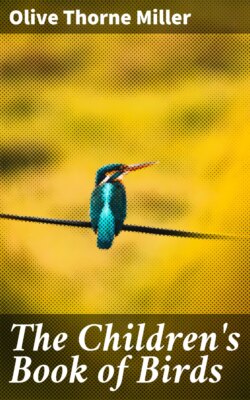Читать книгу The Children's Book of Birds - Olive Thorne Miller - Страница 26
На сайте Литреса книга снята с продажи.
XVI
ОглавлениеTable of Contents
HIS WINTER HOME
Nearly every bird has two homes, one for winter and one for summer.
We can see why birds leave us and go to a warmer and better place for the winter; but why they do not stay in that country where there is always plenty of food, but choose to come back in the spring to their old home, we do not know.
It may be because they want more room to build nests, and bring up their little ones. Or it may be that they want to come back because they love their old home.
Whatever may be the reason, it is well for us that they do so, for if we had no more birds in the summer than we have in the winter, we should suffer very much from insects. We could not raise fruit, or vegetables, or grain, for insects would eat it all. That is one reason we are so glad that birds come back to us in the spring.
Though so many birds leave us in the fall, they do not all go. A few come to us who have nested farther north, and some who have been with us all summer stay over winter too. These last are called "permanent residents," that is, they stay all the year round.
In the Middle States of the East—New York, Pennsylvania, New Jersey, and Ohio—there are twenty or twenty-five who stay all the year. There are several hawks and owls and woodpeckers, the crow, bob-white, the blue jay, and the meadowlark, and, of the little ones, the goldfinch, in his sober winter coat, his cousin the purple finch, the song sparrow, the nuthatch, and the chickadee.
Besides these "permanent residents," there are ten or twelve who come from the north. The funny little saw-whet owl is one, and the snowflake, who loves to frolic in the snow, is another.
Many of our summer birds stay in the Southern States all winter. Those who can eat seeds and winter berries—for instance, robins and bluebirds, catbirds and sparrows—need not go very far south; and some of them even stay in the State of New York.
Most of our birds who do not eat berries, but must have insects, go farther, some to Florida or the West Indies, others to Central America, and a few even into South America,—except the woodpecker, who gets his insects under the bark of trees.
The summer birds of the Western States nearly all go to Mexico for the winter.
The little birds who stay with us are only those who can eat seeds, as I said, or the eggs and insects to be found in the crevices of the bark on trees. These birds do a great deal of good, for each one destroys thousands of insects before they have come out of the egg. One small chickadee will eat several hundred insect eggs in a day.
These little fellows can almost always find their food, for the snow seldom covers the trunks of the trees; but now and then in the winter we have an ice storm; then the trunks and branches are buried under ice, so that the birds suffer, and perhaps will starve to death.
In such a time it will be kind of you who live in the country to put out food for them. You can give them any table scraps of meat or vegetables, or bread, chopped fine for their tiny mouths, with corn or grain for bigger birds.
What they all like best to eat is suet,—which the butcher will give you,—chopped fine, or, better still, nailed or tied to a branch or a fence, so that they can pick off morsels for themselves. This will make them all very happy; but you must see that the English sparrow does not drive them away, or eat it all himself.
Some persons who live in the country or small towns spread a table every day through the winter for the birds. Many come for food, and they have great pleasure in watching them and studying their ways.
One lady I know who is an invalid, and her greatest happiness in the long cold months, when she cannot go out, is to set her breakfast-table, and watch the guests who come to it.
She lives in the southern part of Ohio, and she has all winter cardinal grosbeaks, or redbirds as she calls them, blue jays, tufted titmice, and others. The cardinals are fine singers, and they sing to her every month in the year.
